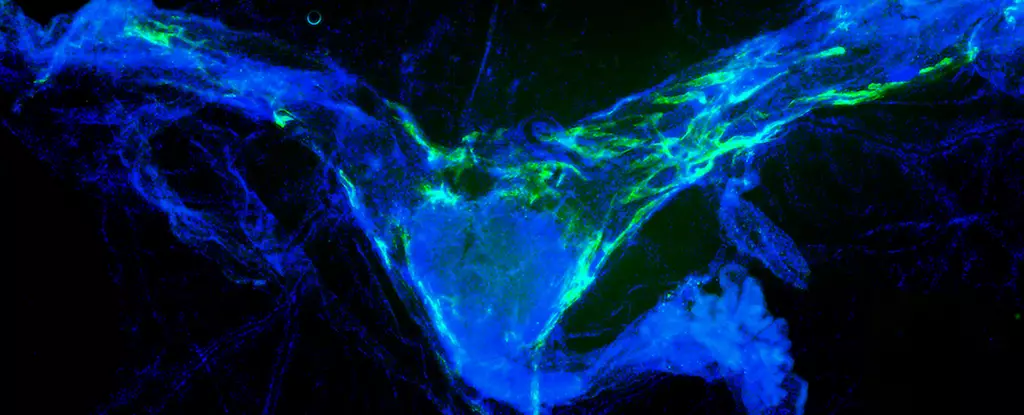As we journey through life, our brains face a relentless battle against the accumulation of waste. This process becomes increasingly critical as we age, yet paradoxically, the very systems designed to clean and maintain cognitive function often begin to falter. Recent breakthroughs in neuroscience reveal that our brains possess a dedicated waste management system that, when optimized, can dramatically enhance memory and cognitive abilities. This could signify a beacon of hope for those facing neurodegenerative diseases, particularly as we witness alarming increases in conditions such as Alzheimer’s disease.
Meningeal lymphatics, a group of vessels encasing the brain, are the unsung heroes of this waste management network. Researchers from Washington University in St. Louis have spotlighted these lymphatic vessels, revealing their pivotal role in ensuring cognitive health by efficiently managing trash disposal and supporting immune functions. Under the microscope, these vessels represent something akin to a city’s sanitation department; without their maintenance, intellectual functions deteriorate, akin to how city life comes to a standstill without effective waste disposal.
The Breakthrough Innovations
Imagine a targeted protein treatment capable of invigorating these lymphatic vessels in aging brains. The scientists’ experiments on mice demonstrate that it’s not merely theoretical; real progress can be made. By enhancing lymphatic function, they observed marked improvements in memory recall, suggesting that it may be possible to bolster cognitive memory well into old age. Translating these findings to human applications could lead us to therapeutic strategies that genuinely mitigate memory loss associated with aging.
The excitement around interleukin 6—a protein acting as a distress signal for overwhelmed immune cells—further underlines the delicate balance within our brain’s environment. When the waste management system falters, this protein floods the brain, announcing chaos rather than clarity. The treatment that reduces interleukin 6 not only safeguards cognitive abilities but also restores operational harmony among microglia, the brain’s frontline defenders. These developments showcase an encouraging glimpse into the brain’s capacity for self-renewal when given appropriate support.
Navigating the Challenges of the Blood-Brain Barrier
A compelling aspect of these findings lies in the innovative approach to accessing brain health without the conventional hurdles posed by the blood-brain barrier. This barrier is infamous for complicating treatments aimed at neurological disorders. Instead of vainly trying to penetrate this seemingly impenetrable fortress, researchers are cleverly directing focus toward external lymphatic vessels. By embracing this alternative route, we unlock a treasure trove of therapeutic possibilities that could reshape our understanding of cognitive health management in aging populations.
Neuroscientist Jonathan Kipnis aptly states that the newly identified pathways could lead to “more powerful therapies to prevent or delay cognitive decline.” There lies an exhilarating opportunity not only to treat existing conditions but also to develop preventative measures that cater to the broader aging population. Investing in this area might usher in a new era of effective dementia care that has been sorely lacking.
Linking Prior Research to Current Insights
The current narrative is enriched by aligning these discoveries with earlier findings, particularly a study in 2022 that demonstrated improved memory through cerebrospinal fluid injections. This continuity of research illustrates the synergy of scientific inquiry and reinforces the notion that enhancing the efficiency of waste disposal may leave neurons better equipped to perform their functions optimally. In this light, we might not completely regenerate lost neurons—but we can certainly enhance their capabilities and fortify cognitive resilience.
By shifting our understanding from repair-focused strategies to enhancing operational capacity and efficiency, we hold the potential to transform how society approaches aging and memory. It’s a radical notion that prompts reflection on the existing healthcare frameworks, which often prioritize immediate fixes over long-term enhancements. The questions arise: should we rethink our priorities? Are we ready to invest in an evolutionary understanding of our cognitive health?
In this emerging landscape, we stand at an intersection of hope and responsibility. Knowledge is power, and as this pioneering research unravels new possibilities, we must prioritize smart solutions. Not merely for those already struggling with memory loss, but for young and old alike, understanding that a functioning lymphatic system is not just crucial for individual health, but the future of our collective well-being.


Leave a Reply